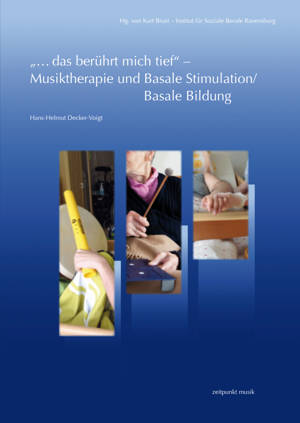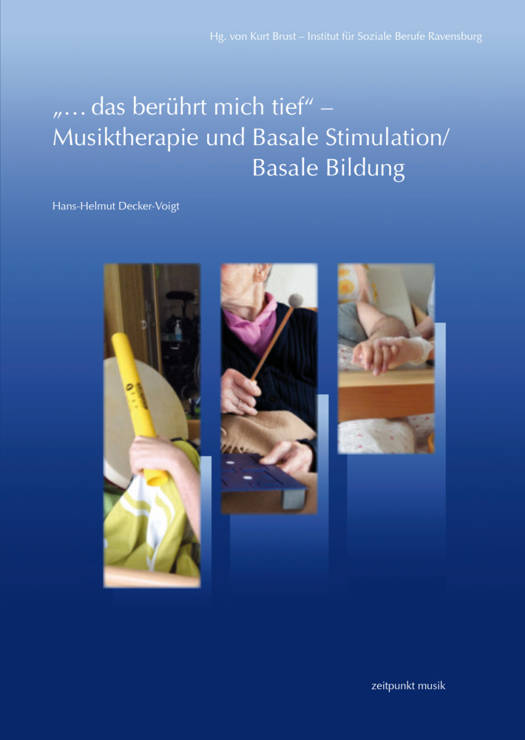
- Retrait gratuit dans votre magasin Club
- 7.000.000 titres dans notre catalogue
- Payer en toute sécurité
- Toujours un magasin près de chez vous
- Retrait gratuit dans votre magasin Club
- 7.000.0000 titres dans notre catalogue
- Payer en toute sécurité
- Toujours un magasin près de chez vous
...Das Beruhrt Mich Tief - Musiktherapie Und Basale Stimulation/Basale Bildung
Eine Zusammenfuhrung Unter Einbeziehung Therapeutischer Grundgedanken Der Logotherapie Von Viktor E. Frankl
Hans-Helmut Decker-Voigt
64,45 €
+ 128 points
Description
The concept of "basic stimulation" (Basale Stimulation as used by Bienstein, Frohlich and many others) comes originally from areas such as geriatric care and work with coma and PVS (persistent vegetative state) patients, a group needing complete care. It is based on accounts of the effect of tactile-haptic stimulation (touch) on the affective state of the client and the ways in which the client can be helped to experience such stimulation (e.g. in the holistic perception of washing procedures). The author first encountered this work during his projects in the hospice movement, palliative medicine and gerontology. In this book he links it with the principles and practice of music therapy against a background of thought that is rooted in phenomenology and developmental psychology. Accordingly, emphasis is given to the basic connections involved in the client's tactile, haptic and auditory perception which is itself viewed as a truly multimedia experience stimulating human communication. The practical and theoretical topics include touching and humming/ singing, touching in the structure of a sonata and singing songs relating to the client's own musical biography (with clients and / or the people closest to them). In this connection the author establishes a new theoretical context for music therapy by linking it with, and thus basing important parts of it upon, the logotherapy and existential analytical psychotherapy of Viktor F. Frankl. This book is written first and foremost for all the social professions (kindergarten teachers, those caring for and teaching people with disabilities, social pedagogues, specialist nurses and carers etc.). The aim is to make clear how music can - and should - be seen as a physical stimulant and, in addition, as a factor influencing the individual's emotional and affective balance to induce vitalisation and deep relaxation. This has consequences for therapeutic care. The book includes very simple single-tone exercises and vocal forms; these can be played either to the client ("Furspiel", Timmermann) or with the client while recognising the importance of the intermediate playing space. It also combines proven practical approaches with theoretical models (some of which are extended) from both receptive and active music therapy (as described by Frohne-Hagemann, Hegi and many others). More complex musical interactions are prepared and lead to the final section in which practical models are offered. Music therapy is now a recognised health specialty and has long been established as an academic discipline. Against this background the book recommends that all members of the interactive professions (those who work with people) should have a basic knowledge of music therapy methods and should be able to apply them. The book's editor is Kurt Brust, Director of the Institute for Social Professions and Training Academy in Ravensburg, Germany. The institute places particular emphasis on the holistic view of the human as mind, body and spirit. This view is independent of the state of health, which is initially irrelevant for the teaching process. A new all-round need for "basic education" (Basale Bildung) is identified - a need that is greatest in people with severe disabilities.
Spécifications
Parties prenantes
- Auteur(s) :
- Editeur:
Contenu
- Nombre de pages :
- 148
- Langue:
- Allemand
- Collection :
Caractéristiques
- EAN:
- 9783954902088
- Date de parution :
- 25-10-16
- Format:
- Livre broché
- Format numérique:
- Trade paperback (VS)
- Dimensions :
- 168 mm x 239 mm
- Poids :
- 294 g

Les avis
Nous publions uniquement les avis qui respectent les conditions requises. Consultez nos conditions pour les avis.






